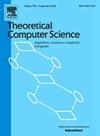无反应物和无抑制剂反应系统的循环和全局吸引子
IF 1
4区 计算机科学
Q3 COMPUTER SCIENCE, THEORY & METHODS
引用次数: 0
摘要
我们探讨了在无抑制剂和无反应物反应系统动力学中,确定可从任何其他状态(称为全局吸引子)到达的不动点和循环的存在性的计算复杂性。我们考虑的问题在无约束反应体系的情况下都是已知的pspace完备的;在本文中,我们证明了当限制在无抑制剂和无反应物的反应体系时,其中一些是多项式可解的,而另一些则保持pspace完备。具体来说,我们证明了判定(i)给定状态是否属于一个循环,(ii)两个反应系统是否至少有一个共同循环,以及(iii)它们是否有相同的一组循环的问题,即使在无抑制剂和无反应物类中也是pspace完全的,以及判定无反应物反应系统中是否存在全局循环吸引子的问题。然而,有趣的是,我们证明了在无抑制剂的反应体系中不存在长度至少为2的全局循环吸引子;在无反应物反应体系中不存在长度大于2的全局循环吸引子。进一步证明了在无抑制剂和无反应物反应系统中,判定给定状态是否为全局吸引子和是否存在全局不动点吸引子的问题是多项式可解的。本文章由计算机程序翻译,如有差异,请以英文原文为准。
Cycles and global attractors of reactantless and inhibitorless reaction systems
We explore the computational complexity of deciding the existence of fixed points and cycles that can be reached from any other states (called global attractors) in the dynamics of inhibitorless and reactantless reaction systems. The problems we consider are all known to be -complete in the case of unconstrained reaction systems; in this paper, we show that some of them become polynomially solvable when limited to inhibitorless and reactantless reaction systems, while others remain PSPACE-complete. Specifically, we prove that the problems of deciding (i) if a given state belongs to a cycle, (ii) whether two reaction systems have at least one cycle in common, and (iii) whether they have the same set of cycles, remain PSPACE-complete even in the inhibitorless and reactantless classes, as well as the problem of deciding if a global cycle attractor exists in a reactantless reaction system. Interestingly, however, we demonstrate that no global cycle attractor of length at least 2 can exist in inhibitorless reaction systems; and no global cycle attractor of length greater than 2 can exist in reactantless reaction systems. Furthermore, we show that the problems of deciding whether a given state is a global attractor and whether a global fixed point attractor exists become polynomially solvable when restricted to inhibitorless and reactantless reaction systems.
求助全文
通过发布文献求助,成功后即可免费获取论文全文。
去求助
来源期刊

Theoretical Computer Science
工程技术-计算机:理论方法
CiteScore
2.60
自引率
18.20%
发文量
471
审稿时长
12.6 months
期刊介绍:
Theoretical Computer Science is mathematical and abstract in spirit, but it derives its motivation from practical and everyday computation. Its aim is to understand the nature of computation and, as a consequence of this understanding, provide more efficient methodologies. All papers introducing or studying mathematical, logic and formal concepts and methods are welcome, provided that their motivation is clearly drawn from the field of computing.
 求助内容:
求助内容: 应助结果提醒方式:
应助结果提醒方式:


